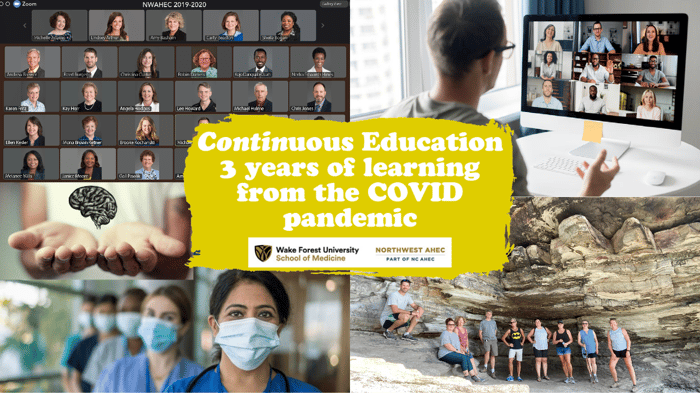Three years after the world shut down and forced a stay-at-home order due to COVID-19 pandemic response, Northwest AHEC is looking back and REFLECTING on what we have learned.
Like many companies we were told to not gather in person, not knowing how long – which forced our department to work exclusively from our homes. We quickly transitioned all employees to remote and cancelled in person programs as we began thinking about what the future would hold in this uncertain time.
Initial Observations...
One of the first things our team highlighted during a recent staff meeting is that our team has better CONNECTION since the pandemic. We transitioned to WebEx instead of face-to-face meetings and even incorporated a Daily Huddle for all staff to join at 8:30am every workday that ensured the continuity of our business to deliver continuing education to our healthcare professionals across the region, state, and country. We’ve seen our department really shine in this new way of doing business and we’re more connected now more so than ever. Many employees mentioned that they have built deeper relationships with colleagues seeing them daily on huddles and have enjoyed finding different ways to communicate while not in person. As some of the mandates lifted the Northwest AHEC team began meeting in person for outdoor gatherings and going to parks to re-group and gather safely – our team has appreciated getting together and celebrate our time together even more than before. Without a doubt, online and hybrid meeting are here to stay, as many companies are transitioning back to in-person work our team has proven successful working remotely and will continue to work this way for the future.
When shifting to online learning we had to become “Comfortable and confident in taking risks and creating engagement in the virtual space” according to Andrew Brewer, NWAHEC Instructional Technologist. Our team was INNOVATIVE and forward thinking which helped us pivot quickly when necessary to transition our employees to remote as well as transition our Continuing Professional Development (CPD) from in-person to live webinars. An example of this is the increased use of online polling and surveys to engage learners during virtual programs, including “ice-breaker” questions to create an atmosphere of comfort, trust, and safety. Some programs featured scheduled stretching, meditation, and yoga breaks to keep attention and interest levels high during long online activities.
In transitioning to more online learning for our core services we quickly realized this would open us up to a whole new world of possibilities. Greater REACH across the 17-counties we serve, across the state of North Carolina and even across the country. We saw an increase in participants and were able to now reach a larger audience – giving better ACCESS to education.
- Over the past few years, we’ve noticed an up-tick in unique participants for CPD programs from across NC and around 9% of participants being from across the country.
- After COVID in 2020, had to move to virtual program for Camp Med – that year we saw a huge influx of high school students with over 900 participants, and it has continued to be popular even as in person camps started back in our 17-county area.
- Our Practice Support team has been able to connect and support our practices in the new virtual setting, allowing them better access to our resources.
We have continued to provide high quality work that matters, our mission remains to provides and supports educational activities and services with a focus on primary care in rural communities and those with less access to resources to recruit, train and retain the workforce needed to create a healthy North Carolina. We are able to reach the rural communities more effectively and efficiently by allowing them to connect with us in an easier way. There is less of a need to incur costs for travel or overnight hotel, when some CPD programs are offered as live webinars or hybrid settings. While we cherish our in-person times together, the COVID pandemic and nationwide response forced us to re-evaluate how we operate, and we’ve seen improvements made that will benefit our stakeholders for many years to come.




